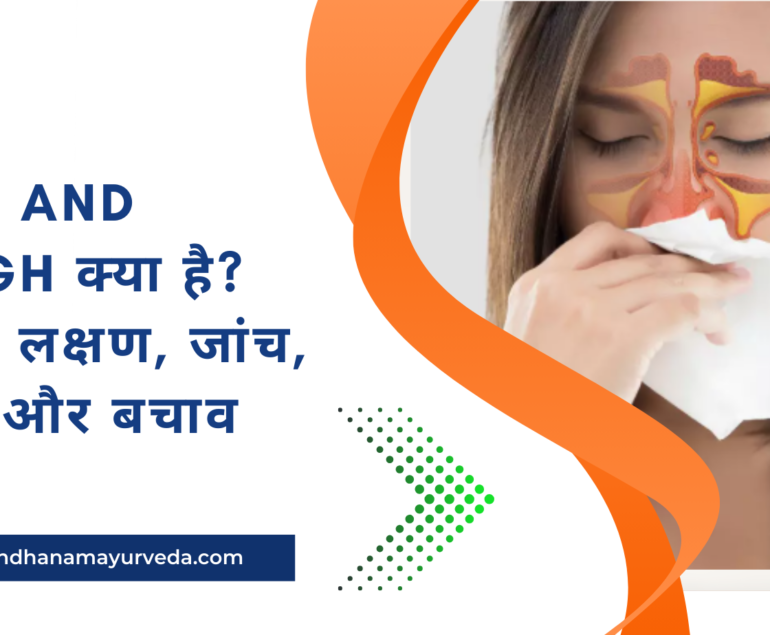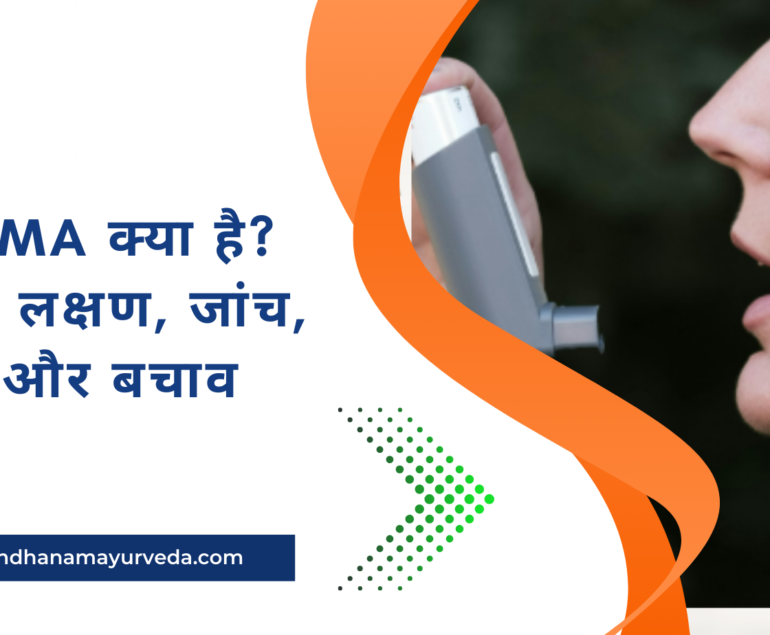Fistula, known as भगंदर (Bhagandar) in Hindi or नाड़ीव्रण (Nadi Vrana) in Sanskrit, is a painful and often distressing condition that affects many people in India. It is a health issue that can significantly impact quality of life if not addressed properly. This blog explains fistulas in simple language, tailored for Indian readers, covering its causes, symptoms, treatments (including the role of Ksharsutra), and prevention tips.
What Is a Fistula (Bhagandar)?
A fistula is an abnormal tunnel-like connection between two parts of the body, such as between the anus and the skin around it (called an anal fistula or गुदा भगंदर). In most cases, an anal fistula develops when an infection in an anal gland forms an abscess (pus-filled cavity) that bursts or is drained, leaving a passage that doesn’t heal naturally. This condition is common in India due to factors like poor hygiene, spicy diets, and lack of awareness, but it is treatable with proper medical care.
Types of Fistula
Anal fistulas, the most common type discussed here, are classified based on their path and complexity:
1. Simple Fistula (साधारण भगंदर): A single, straightforward tunnel between the anus and skin, often easier to treat.
2. Complex Fistula (जटिल भगंदर): Multiple tunnels or those involving deeper tissues, requiring advanced treatment.
3. Low Fistula: Closer to the anal opening, less complicated.
4. High Fistula: Deeper and closer to the sphincter muscles, needing careful treatment to avoid complications.
Causes of Fistula
Fistulas usually result from an untreated or poorly managed infection. Common causes include:
1. Anal Abscess (गुदा में फोड़ा): An infected gland in the anus forms pus, leading to a fistula if not treated.
2. Chronic Constipation (कब्ज): Straining during bowel movements increases pressure in the anal area.
3. Infections: Bacterial infections or conditions like tuberculosis can trigger fistulas.
4. Crohn’s Disease or Ulcerative Colitis: Inflammatory bowel diseases that may cause fistulas.
5. Trauma or Injury: Surgery, accidents, or injury to the anal region can lead to fistulas.
6. Poor Hygiene: Lack of proper anal hygiene, common in humid climates, can cause infections.
7. Spicy or Unhealthy Diet: Excessive consumption of spicy or oily foods, common in Indian diets, can irritate the digestive tract.
8. Sedentary Lifestyle: Prolonged sitting reduces blood flow, increasing infection risk.
Symptoms of Fistula
Fistula symptoms can be uncomfortable and persistent. Look out for:
• Pain or Discomfort: Throbbing pain around the anus, especially during bowel movements or sitting.
• Pus or Blood Discharge: Foul-smelling pus or blood oozing from an opening near the anus.
• Swelling or Redness: Inflammation around the anal area.
• Itching or Irritation: Constant discomfort or itching near the fistula opening.
• Recurrent Abscesses: Repeated swelling or boils in the same area.
• Fever: In case of infection or abscess formation.
• Difficulty Controlling Bowel Movements: In severe cases, if the fistula affects sphincter muscles.
If you notice these symptoms, especially pus discharge or recurrent pain, consult a doctor immediately.
Diagnosis of Fistula
A proctologist, general surgeon, or Ayurvedic practitioner can diagnose a fistula through:
1. Physical Examination: Checking for external openings or swelling near the anus.
2. Digital Rectal Exam: Feeling for abnormal passages or abscesses.
3. Imaging Tests: MRI, ultrasound, or fistulography to map the fistula’s path.
4. Proctoscopy: A camera to view the anal canal for internal openings.
In India, many people hesitate to seek help due to embarrassment, but early diagnosis is key—स्वास्थ्य सर्वोपरि (Health is paramount).
Treatment Options for Fistula
Fistulas rarely heal on their own and often require medical intervention. Treatment options include home care, medications, and procedures.
1. Home Remedies and Lifestyle Changes
For mild symptoms or to support treatment:
• Maintain Hygiene: Wash the anal area gently with warm water after bowel movements to prevent infection.
• Sitz Bath (गर्म पानी का स्नान): Soak the anal area in warm water for 15-20 minutes, 2-3 times daily, to reduce pain and swelling.
• High-Fiber Diet: Eat fruits (papaya, apples), vegetables (spinach, okra), and whole grains (brown rice, oats) to prevent constipation.
• Stay Hydrated: Drink 8-10 glasses of water daily to soften stools.
• Avoid Spicy Foods: Reduce consumption of spicy or oily foods like fried snacks or excessive masala.
• Triphala Churna: An Ayurvedic remedy to improve digestion and ease bowel movements.
2. Medications
• Antibiotics: To treat infections or abscesses, prescribed by a doctor.
• Painkillers: For temporary relief from pain, but avoid overuse.
• Anti-inflammatory Creams: To reduce swelling and discomfort.
3. Ayurvedic Treatments
Ayurveda offers holistic remedies:
• Jatyadi Oil: Applied locally to reduce inflammation and promote healing.
• Guggul: An Ayurvedic herb to control infection and swelling.
• Haritaki: Improves digestion and prevents constipation.
4. Medical Procedures
For persistent or complex fistulas, procedures include:
• Fistulotomy: Cutting open the fistula tract to allow healing. Suitable for simple, low fistulas.
• Seton Placement: A thread is placed in the fistula to drain pus and promote gradual healing.
• Fibrin Glue or Plug: Sealing the fistula with biocompatible materials, though less effective for complex cases.
• LIFT Procedure (Ligation of Intersphincteric Fistula Tract): A modern technique to close the fistula while preserving sphincter function.
Role of Ksharsutra in Fistula Treatment
Ksharsutra (क्षारसूत्र) is a highly effective Ayurvedic procedure widely used in India for treating anal fistulas, especially complex and recurrent ones. It uses a medicated thread coated with herbal alkaline substances (kshar) to heal the fistula without extensive surgery. Here’s how it works:
• Procedure: Under local or spinal anesthesia, an Ayurvedic surgeon threads the Ksharsutra through the fistula tract. The medicated thread (coated with herbs like apamarga, turmeric, and guggul) gradually cuts through the fistula, removes infected tissue, and promotes healing. The thread is replaced weekly to ensure continuous healing.
• Benefits:
• Minimally Invasive: No large incisions, leading to faster recovery than conventional surgery.
• High Success Rate: Studies show Ksharsutra has a low recurrence rate (less than 5%) compared to other methods.
• Preserves Sphincter Function: Reduces the risk of incontinence, a concern in complex fistulas.
• Cost-Effective: Affordable in India, especially in Ayurvedic hospitals.
• Ayurvedic Advantage: Uses natural herbs, aligning with India’s traditional healing practices.
• Recovery: Healing takes 4-8 weeks, depending on the fistula’s complexity. Patients can resume normal activities within days but need weekly thread changes and follow-up.
• Suitability: Ideal for both simple and complex fistulas, including those recurring after surgery.
• Precautions: Must be performed by a trained Ayurvedic surgeon. Proper hygiene and post-procedure care are essential to prevent infection.
Ksharsutra is a preferred choice in India due to its effectiveness and alignment with Ayurvedic principles. It’s widely available in Ayurvedic hospitals and clinics, making it accessible for many. Consult an experienced practitioner to determine if Ksharsutra is right for you.
Prevention Tips for Fistula
As the Sanskrit saying goes, निदानं परिहारः (Prevention is better than cure). Prevent fistulas with:
1. Good Hygiene: Clean the anal area thoroughly after bowel movements to avoid infections.
2. Fiber-Rich Diet: Include मूली (radish), पालक (spinach), दलिया (porridge), and fruits to prevent constipation.
3. Stay Active: Walk, practice yoga (e.g., Pavanamuktasana), or exercise to improve blood flow.
4. Avoid Straining: Don’t push hard during bowel movements.
5. Hydration: Drink plenty of water to keep stools soft.
6. Treat Abscesses Early: Seek medical help for any anal swelling or pain to prevent fistula formation.
7. Limit Spicy Foods: Reduce irritation from excessive spices or oily foods.
When to See a Doctor
Consult a doctor if you experience:
• Persistent pain or swelling near the anus.
• Pus or blood discharge from an anal opening.
• Recurrent abscesses or fever.
• Difficulty controlling bowel movements.
Don’t delay due to shyness—early treatment prevents complications like chronic fistulas or infections. लाज छोड़ो, स्वास्थ्य जोड़ो (Let go of shame, embrace health).
Myths and Facts About Fistula
Myth: Fistulas heal on their own without treatment.
Fact: Most fistulas require medical intervention to heal completely.
Myth: Only spicy foods cause fistulas.
Fact: Spicy foods can irritate but don’t directly cause fistulas; infections are the main cause.
Myth: Fistulas only affect older people.
Fact: Anyone can develop a fistula, especially after an untreated abscess.
Living with Fistula
Fistulas can be distressing, but with proper treatment like Ksharsutra, a healthy diet, and hygiene, you can recover fully and prevent recurrence. In India, where spicy diets and sedentary lifestyles are common, small changes like eating fiber-rich रोटी-सब्जी and staying active can make a big difference. Seek medical advice promptly to improve your quality of life.
Conclusion
Fistulas (भगंदर or नाड़ीव्रण) are painful but treatable with timely care. From home remedies to advanced procedures like Ksharsutra, there are effective options to manage this condition. Focus on hygiene, a fiber-rich diet, and early medical consultation to prevent and treat fistulas. As the saying goes, स्वस्थ रहें, मस्त रहें (Stay healthy, stay happy)!
For more health tips or to consult a doctor, visit a trusted clinic or healthcare website. If considering Ksharsutra, seek an experienced Ayurvedic practitioner for the best results.




